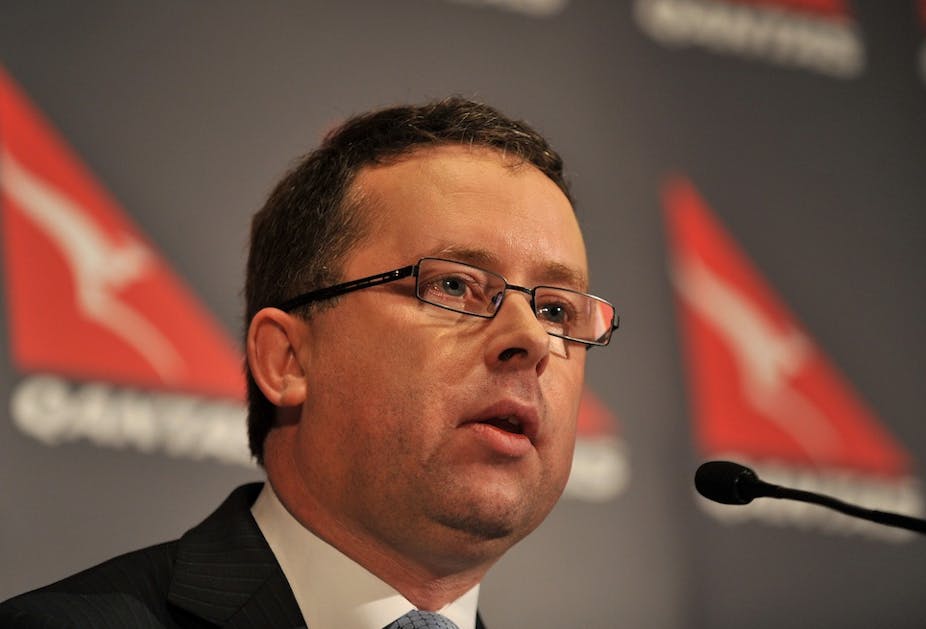Plans announced by Qantas to cut 500 jobs have been greeted with dismay by unions, who have warned they will hold chief executive Alan Joyce to his promise that maintenance jobs will not go overseas.
Qantas will also reduce some international and domestic routes, amid a drop half year net profit from $241 million to $42 million, savaged by both October’s airline shutdown, which cost $194 million and fuel costs which cost $444 million more than the previous corresponding period.
The airline will consolidate its three heavy maintenance operations in Melbourne, Brisbane and Avalon. Yesterday’s job losses comes only months after Fairwork Australia was forced to intervene in negotiations with Qantas’s three key unions.
Michael Rafferty, senior research analyst at the Workplace Research Centre at University of Sydney says he believes the move signifies a “new benchmark in industrial relations in Australia”.
Has Qantas paid a high price, at least in the short-term, for October’s airline grounding?
The recent actions of Qantas management to me has smacked of a fairly strong ideological element, and just as importantly the way they have gone about that change seems to be based on the idea that management control is an absolute. Taken together, I see it as a new benchmark in Australian industrial relations - you might say that Qantas is overtaking Rio Tinto and companies like that in saying “we do not compromise on managerial autonomy”.
Whether or not their strategy is going to have any long-term gain, it has had a very large impact right now in the almost $200 million hit to their profits. It is tempting to ask when they began the dispute what they they calculated it would cost shareholders. The company now appears to be weaker than before the dispute, and you will notice that instead of expansion and growth the story now turns to cutbacks.
If I was a private equity firm or another global airline, I would be watching the Qantas shareprice. This announcement is sure to drive their price lower in coming months. So they are actually more vulnerable to takeover now than at any other time in the last five or six years. They are in a weakened state - not that Qantas is a bad business, it’s not that the brand is not significant and they’ve got a lot of loyalty. But I do think if I was looking from the outside, I would be thinking, surely we can do better than the current management team.
As a result of recent actions they’ve got terrible relations with their workforce, they have damaged their customer relations, and of course we know what the dispute did to their government relations - it starts to look Telstra all over again.
So how do you expect relations between the unions and Qantas will be from now on?
One of the unions’ constant positions has been about job security, and Qantas have been steadfast in not making any guarantees about it. I imagine this idea of shutting one of the maintenance plants has been on their agenda for some time. And it is probably more than just a coincidince that the timing of the announcement is similar to the lockout - in coming only two days after the group’s AGM. So they are using accounting reporting to justify radical change and the right of management to act unilaterally.
It does make you wonder what sort of relations unions can have with a company like this. We have been used to the media reporting on militant unions, but this is a militant employer. One thing I noticed was that this announcement came as a shock to all of the unions. Yet as Alan Joyce has made clear, management and unions have held hundreds of meetings about restructuring, and yet they can spring a decision like this on the public and the workforce. They really are acting like a private equity firm - straight out of the film Wall Street, slash and burn, and hope the sharemarket will reward them for this. Under the cloak of protecting the brand and all the management weaslewords, they really are pioneering a radical agenda in industrial relations.
Qantas have said they will not offshore maintenance and that the newer aircraft require less maintenance, but one would have imagined that over time when we got over the GFC and airline capacity started picking up, maintenance would pick up. The obvious question is once you cut capacity and soon as there is an increase in demand, new capacity will have to be added - will that capacity be added in Australia?

